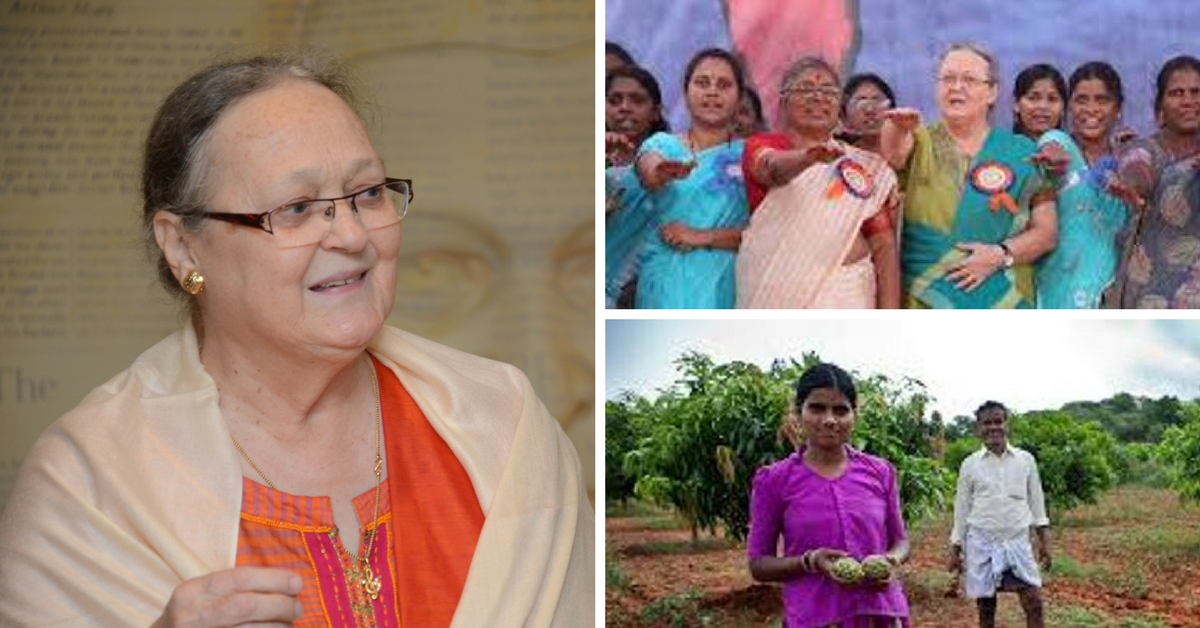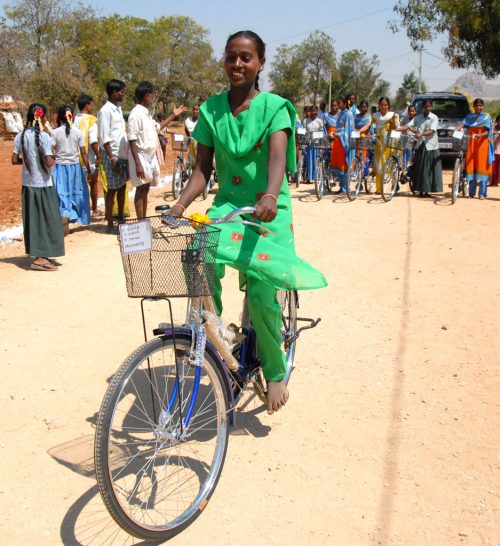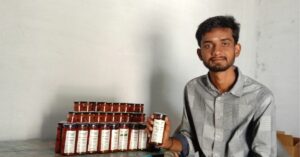TBI Blogs: Meet the Woman Who Has Been Empowering Tribals in Ananthapuram for Over Four Decades
Plagued by drought, regressive social customs, and lack of access to facilities, the situation is especially dire for the women and children of Andhra Pradesh and Telangana. However, one woman, and her organisation, are tipping the scales in favour of these people and giving them hope for their future.

A high percentage of the population of Andhra Pradesh and Telangana ranks among the poorest sections of India. Plagued by drought, regressive social customs, and lack of access to facilities, the situation is especially dire for the women and children of the region. However, one woman, and her organisation, are tipping the scales in favour of these people and giving them hope for their future.
Mrs. Anne Ferrer was born in England on April 10, 1947. She came to India and studied journalism in Mumbai. After marrying Mr. Vincent Ferrer, the couple moved to Ananthapuram, a chronic drought-prone district in Andhra Pradesh, with the sole intent of serving the poorest of the poor in India. This led to the setting up the Rural Development Trust (popularly called RDT) in 1969.
Mrs. Anne Ferrer has been working in the Ananthapuram district for over four decades. She speaks the local language, and works tirelessly for the development of the women and children of the region. She believes in building strong leadership to fulfill the mission and vision of the organization in accordance with the guiding principles that constitute its DHARMA—“concern for poor and needy”, “work beyond duty”, “pursuit of excellence in work”, and “reaching as many poor as possible”.
Since the very beginning, RDT has focussed on strengthening community-based organisations (CBOs) through a series of participatory capacity-building trainings, both for the people and its team.
Its impact is seen in the collective strength of Dalits, tribes, backward castes, and rural poor, who jointly assert their rights and mobilize various resources and services for their welfare and development.
RDT works for the integrated development of marginalized sections – scheduled castes, scheduled tribes, backward castes, and persons with disabilities – in 3,291 villages in six districts of the region—Ananthapuram, Kurnool, Guntur, and Prakasam of Andhra Pradesh, and Mahaboobnagar and Nalgonda of Telangana State. There are over 10,281 Chenchu families, with a population of 39,084 spread across 258 villages, in Nallamala forest who have been covered under RDT’s integrated programs of development since 2010. From a modest beginning, the organisation has scaled up over the years and extended continuous support to millions of rural poor families caught in the vicious cycle of poverty, helping them improve their quality of life and live with identity and human dignity.
The organisation’s programme interventions cover all facets of development, including children’s education and protection of their rights, women’s empowerment, community- and institution-based rehabilitation (CBR/IBR) of persons with disabilities, community health (including HIV/AIDS), community habitat, rural hospitals, and ecological regeneration and environment development. Community Development Committees in the villages are sensitized and empowered through awareness workshops and capacity-building trainings. The Committees are provided access to socio-economic inputs and services which enhances the involvement of poor rural communities as the main actors in their own development process.
RDT has set up three general hospitals, and one hospital for infectious diseases. There are 17 rural health clinics. There are 105 hospital doctors and 15 field doctors. RDT has trained local women to be Community Health Workers (CHWs) in almost every village. The safe delivery project aims at providing access to quality antenatal and post-natal care, with a special focus on anemia, nutrition, health education, identification of risk pregnancies, promoting institutional deliveries, and coverage of all eligible children and mothers under immunization. These grass-root health care services are provided by different categories of workers, from basic Community Health Workers (CHWs) to Auxiliary Nurse Midwives (ANMs), staff nurses, and doctors.
More than 13,330 babies are delivered every year in RDT hospitals.
Mrs. Ferrer has also initiated the Prevention of Mother to Child Transmission (PTMTCT) of HIV project. This has facilitated reduction in vertical transmission of HIV from mothers to infants. RDT gives preference to women and girl children in healthcare referral services, and extends counseling, nutritional support, and needed healthcare and legal guidance to women who are being subjected to violence or psychological harassment in the family and community. Counseling centers are set up to provide guidance, health check-ups, and support to poor migrant women who are pushed into the sex trade.
There are over 1,553 nutrition care centers which provide supplementary nutrition to over 30,000 children in the age group of 0-4 years. Over 7,38,000 outpatients, and 56,000 inpatients, availed the services of RDT hospitals during 2014-15.
RDT has been providing required facilitation and support to the members of Community Development Committees (CDCs) to independently manage and monitor over 3,028 supplementary schools in 2,801 villages providing additional coaching to children belonging to Dalits, Tribes, and Backward Communities. RDT lays special emphasis on girls’ education beyond primary education, and it has so far provided bicycles to over 16,000 school girls for the continuity of their education in secondary schools.
Providing school materials, uniforms, savings grants, and coaching materials is also intended towards achieving 100 % enrollment and over 75 % retention of students at the primary and secondary levels.
2,566 meritorious students, including 1,145 girls, were enrolled under the education special scholarship scheme to pursue intermediate studies in colleges, and to further undertake professional/technical courses such as medicine, engineering, etc. during the years 2014-15. Financial assistance is also given to students who are not covered under the special education scholarship scheme to pursue their higher, professional, and technical courses. During 2014-15, a total of 47,361 students were provided higher educational grants.
Mrs. Ferrer ensures that sports/games and cultural events are also included in the development process of the rural children. There are over 60 rural students training in the hockey academy. With the support of the Rafa Nadal Foundation, over 104 boys and 68 girls are being trained in tennis, computers, and English language.
RDT’s Professional School for Foreign Languages trains boys and girls in English, French, German, and Spanish languages for addressing the demand of the competitive job market. This program provides job opportunities and helps build confidence, personality, and communication skills in the individual. RDT volunteers from abroad come to teach the languages to the students. RDT has also set up computer laboratories for the benefit of the children.
More than 98 % of those who successfully complete their training find jobs fetching decent salary in cities, and thereby help their families come out of poverty.
The special education and rehabilitation programme supports children with disabilities. It also provides care, shelter, nutrition, education, and medical facilities to those suffering from cerebral palsy, along with orthopedic support, physiotherapy, surgery support, and rehabilitation to poor children with disabilities. RDT runs special centers for orphans and children who have been sexually abused and are HIV-infected. Over 1,200 children with disability are pursuing their special education and rehabilitation training at 17 residential centers – both at the primary and secondary levels – run by RDT in nine locations.
Initially, the participation of women hardly existed in all the programmes that were introduced. It took a couple of decades for Mrs. Ferrer to get the women to speak up, come out of their houses, and sensitize them about the right to education and basic knowledge of healthcare for their children.
She enlightened them on safe child birth, and institutionalized deliveries, health, hygiene, savings, income generation, etc. This resulted in the starting of a special women sector in 1982 by Mrs. Anne Ferrer, which was intended for empowering the rural women. Organizing women into self-help groups (women sanghams) promoted solidarity and increased their self-confidence and self-respect.
They are trained in need-based vocational skills, in farm and non-farm sectors, and are also encouraged to manage their mini-banks.
8,122 Self Help Groups, comprising 1,08,612 women, were functioning at the end of March 2015 and of them, 7,444 SHGs in 1,501 villages are managing their mini-banks independently. Mrs. Anne Ferrer’s initiative helped rural women meet their basic as well as emergency needs (e.g. health, children’s education, etc.) without depending on others.
RDT has provided access to a Revolving Fund popularly called the Women Development Fund (WDF), constituted by RDT and covering women representing 7,769 SHGs in 1,550 villages. During 2014-15, as many as 17,291 women accessed WDF for various income-generating schemes, including milch cattle, rams, and petty businesses.
RDT has also been helping SHGs carry out their livelihood with the help of skills acquired in vocational training centres. These include agarbathi, book binding, herbal phenol, sanitary napkins, kalamkari, embroidery, and tailoring. Over 8,300 rural women own more than 10,000 milch cattle. These women have developed strong bonds, and support each other on social and developmental issues, including battling for alcohol prohibition.
RDT has worked to ensure that women have a voice in governance and any issues that arise at the family, community, social, and political levels, and to strengthen them to participate equally with men.
RDT has an exclusive core team of women which addresses and initiates programs for women and works towards enhancing their skills and confidence, thereby ensuring participation and involvement in all activities.

Around 26,116 PWDs, men, and women have been constituted into 2,122 Self Help Groups. They have access to a revolving fund to take feasible income-generating activities, either independently or with the support of their family members. Around 250 women with disabilities have been trained in handicrafts and produce jute, jewellery, and other handicraft items made of eco-friendly materials, which are exported abroad and sold in India through exhibitions and shops. The beneficiaries are trained in technical and design skills for this activity. The groups also work on mobilizing government resources, in advocacy of their rights, and fighting against discrimination based on disability, gender, and caste.
Mrs. Ferrer’s philosophy has helped develop a sense of social responsibility to carry out good actions for others. For instance, the rural poor women and children are taking a lead role in Seva Hundi Movement. The concept of Hundi, with a catchy slogan “Spandinchu Sayam Andinchu” (“Let your hearts respond and hands help”) was introduced in a few project villages in 2012 on an experimental basis, but it spread to over 1,00,000 families in over 2,000 villages. The spirit of this program positively influenced all sections of people, especially the rural poor who, with their little savings in their Hundis, expressed their concern for the poorest of poor and the neediest of needy.
The amount contributed by people is being used for the education of orphaned children, nutritional support to Chenchu tribes, and any other welfare and developmental needs.
To develop social dynamics, Mrs. Ferrer’s guidance has helped in the formation of social action teams at the village level. Around 405 social action teams, with over 1,216 members, have been constituted in 405 villages. These teams support RDT in identification of persons, especially women in distress, requiring counseling, rehabilitation, legal guidance, and other support services in the villages where they work.
Community habitat for the marginalized section is yet another area of service. Over 62,000 houses have been constructed by RDT in the name of women by involving housing beneficiaries and community development committees in lead roles at every stage of construction.
RDT’s team mainly comprises locals. It has over 2,204 employees, and about 3000 volunteers. Mrs. Anne Ferrer strongly believes in teamwork. To develop this ability, the team is encouraged to attend various professional/management training courses and workshops, and carry out extensive field work. The implementation of integrated programs for development is the responsibility of an area team leader who oversees 75-100 villages.
Mrs. Ferrer’s vision and passion is to work for the disadvantaged and marginalized sections. This is reflected in all RDT policies and programmes. Ms. Anne Ferrer is an icon of nobility, humility, and veracity. She is an epitome of love and care, and is a perennial source of inspiration to one and all. Today, Mrs. Ferrer and RDT have touched and made a big difference to nearly every aspect of the lives of the people in Ananthapuram.
In the year 2015, Mrs. Anne Ferrer was conferred with the Jamnalal Bajaj Award in the category of Development and Welfare of Women and Children.
Know an inspirational changemaker working for rural development at the grassroots level? Click below to nominate them for Jamnalal Bajaj Awards 2017.
Unable to view the above button? Click here
Like this story? Or have something to share? Write to us: [email protected], or connect with us on Facebook and Twitter.
NEW: Click here to get positive news on WhatsApp!
If you found our stories insightful, informative, or even just enjoyable, we invite you to consider making a voluntary payment to support the work we do at The Better India. Your contribution helps us continue producing quality content that educates, inspires, and drives positive change.
Choose one of the payment options below for your contribution-
By paying for the stories you value, you directly contribute to sustaining our efforts focused on making a difference in the world. Together, let's ensure that impactful stories continue to be told and shared, enriching lives and communities alike.
Thank you for your support. Here are some frequently asked questions you might find helpful to know why you are contributing?


This story made me
-
97
-
121
-
89
-
167






















